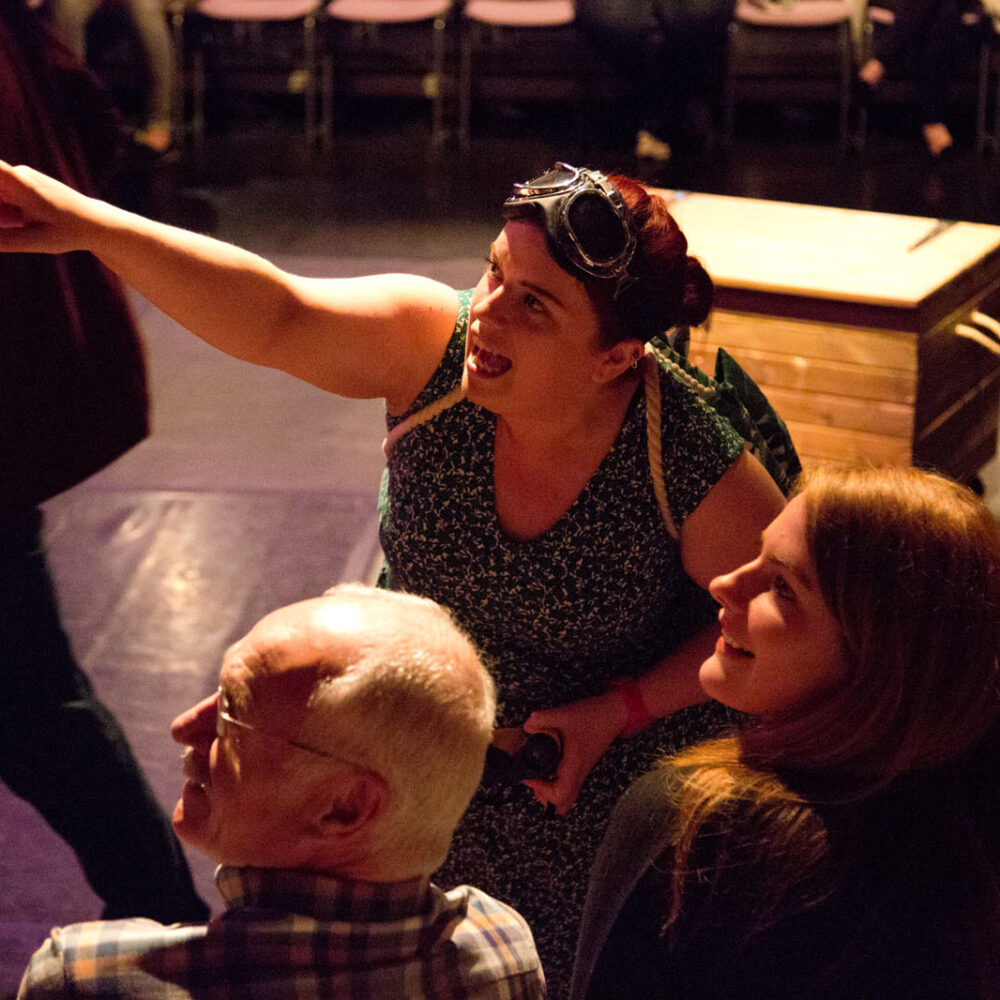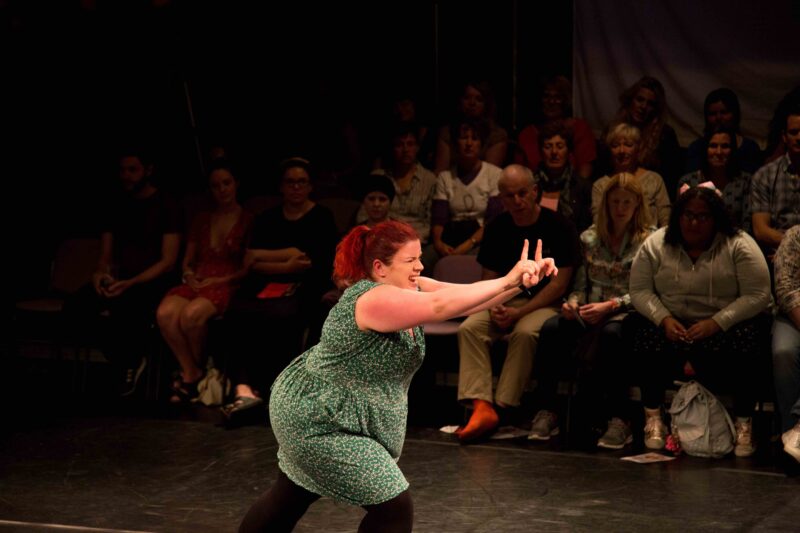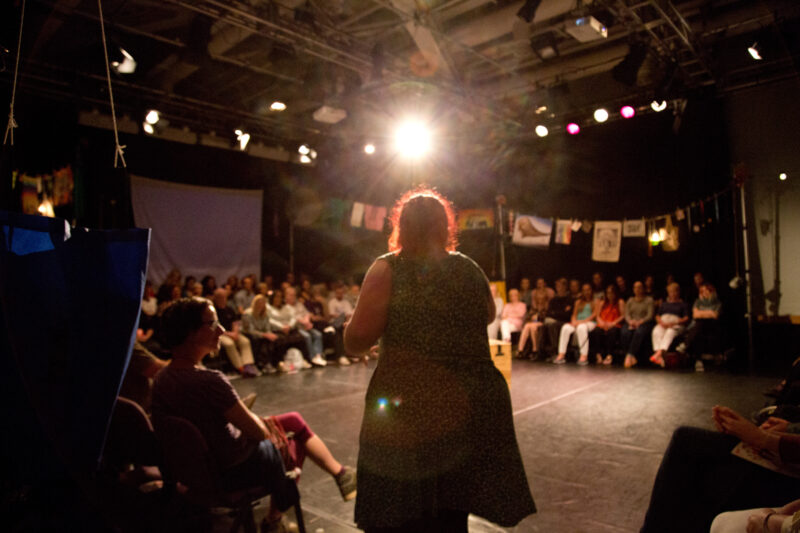



Since Declaration’s first outing at a scratch night in 2016 where I first said out loud to a room full of people ‘this is what it’s like to be me’, over the past 7 years I’ve had more people than I can honestly count tell me that they are starting the same road to ADHD diagnosis.
Declaration, our one-woman show exploring ADHD, mental health and diagnosis, helped a lot of people find the words for how they felt, sometimes to tell their loved ones, other times to a doctor, and I’m incredibly proud of that. The pandemic unveiled a lot for people, and pulled their coping mechanisms from under them. There was already an enormous hole of under diagnosis, and now it seems more people are on the waiting list than ever, especially adults.


It’s often a long time that we wait for our brains to surface the words to describe itself. It’s hard to describe the inner workings of your brain. It takes a lot of courage to say it out loud. And when you feel like a medical professional is in practical mode and not really listening to you, or thinking of you holistically that can push you even further into your shell and convince yourself that you’ll be ok – even though the whole point of you going to the doctors was because you’re not ok.
Trust me when I say I love the NHS. Frontline medical professionals working in the NHS are incredible but undervalued, overworked, stretched beyond capacity. They should not be expected to work in the conditions that they are. But I also recognise that I have often felt like I’m outstaying my welcome in an appointment and not getting to the point quick enough. When I’m talking about something I don’t fully have the language for. I have often left feeling a lot smaller than when I went in.
I wanted to take some time to write to you, as medical professionals, about my own experience and some take away thoughts.
To go to your GP and explain that you’re not coping is really difficult. Most people will have hit a crisis point in order to make that appointment; you’re at your lowest. I know I was. You need help and feel trapped so spending the next 7 minutes describing how you feel and how you are failing is awful.
In British culture, we’re not exactly known for talking about our feelings, but as working class people, we can be guilty of actively avoiding asking for help. Certainly the working class place I come from, we don’t talk about feelings. You don’t ask for help, you keep that smile firmly fixed and sweep your feelings under the carpet; you just crack on. Most importantly, we can’t afford to be ill; I know the NHS is at breaking point and I don’t want to be part of its sinking, because I can’t afford to be without it, I can’t afford to seek out alternative support. With that in mind, I was anxious about getting a diagnosis, it’s easier to reach for often destructive alternative coping mechanisms; they’re cheaper and have far less stigma attached to them than a diagnosis and a pill.


The GP told me that I ticked the boxes for ADHD. It was a relief knowing that something explained my symptoms. He then told me that diagnosis as an adult is long and complex, so unless you are an extreme case it isn’t something they would push for. He asked me to think about it and come back if I wanted to push for a diagnosis.
I left feeling numb and vulnerable. Now I know it’s not something ‘wrong’ with me, it’s just part of what makes me who I am, but back then, I felt broken. I wish I had asked for counselling to support processing the information, but I was in too much of a spiral to even think about what I needed, or what might be useful or helpful.
Later on I accessed counselling. I still do. It stabilised me. Without it, I don’t know where I’d be. It enabled me to make Declaration and talk about my story, which audience members have told us has given them a better understanding of ADHD, and themselves. Speaking out about it, talking to my support network and meeting other adults with ADHD has helped me a lot. Being in a room full of people who experience the world in a similar way to you is so liberating, exhilarating and it’s a huge relief to know you’re not alone.
• Training: For Declaration we spoke to a lot of GPs who admitted knowing very little about it, due to lack of training opportunities.
• Follow up: We’re often at our most vulnerable in those initial days of talking about ourselves, so booking in a follow up appointment there and then would be highly beneficial. If you leave it to them to walk away and figure out what they need, chances are they won’t reach for a healthy coping mechanism to steady themselves and will struggle to return and ask for what they need.
• Referrals: It’s common for adults to be up against long waiting times for a diagnosis and it feels like purgatory. I describe leaving my GP feeling like ‘a china doll in a pin ball machine’. Counselling referrals should be offered because whether they are diagnosed or not, it will undoubtably support them to move away from the crisis point that brought them to you.


• Medication vs Talking Therapy: Why are these often offered in an either/or? For me, counselling and ADHD community groups made an enormous positive impact. Whilst medication might be really effective, it doesn’t give you the opportunity to unpack and understand how you feel about yourself, the label and diagnosis. Talking therapy can help increase your resilience, enable you to build a support network, feel re-connected to society, and ultimately support you to understand what it is you need.
• Support: Don’t let them leave the appointment feeling like something is ‘wrong’ – connect them with a local ADHD group where they can explore the positives, not feel alone, benefit from other peoples lived experience and because the state of mind you leave the doctors in has a lasting impact on how you see yourself.